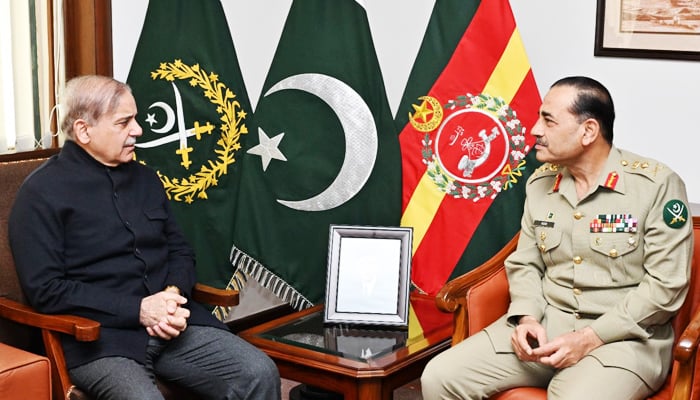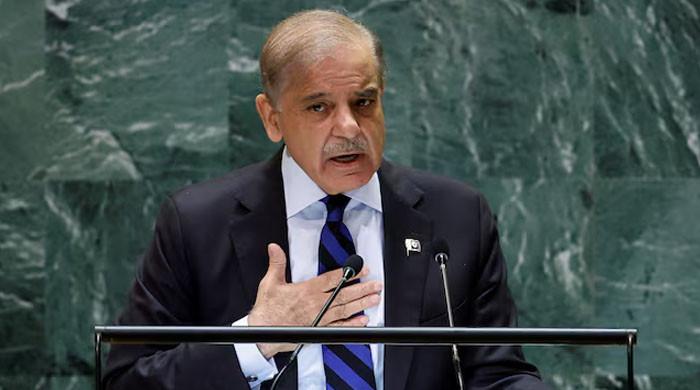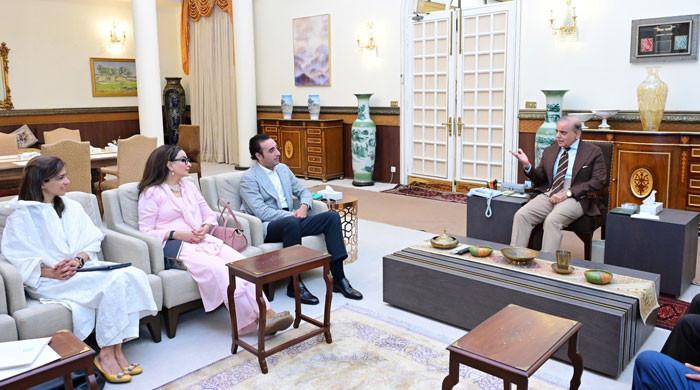 Prime Minister Shehbaz Sharif meets Field Marshal Asim Munir at the General Headquarters in Rawalpindi. — ISPR/File
Prime Minister Shehbaz Sharif meets Field Marshal Asim Munir at the General Headquarters in Rawalpindi. — ISPR/File- India not ready for third-country talks.
- Israeli weapons used in Srinagar conflict.
- Four key points to be raised with India.
Prime Minister Shehbaz Sharif said on Wednesday that the decision to promote Chief of Army Staff (COAS) General Asim Munir, who led Pakistani armed forces during the recent conflict with India, to the rank of field marshal was his own.
In recognition of his exceptional leadership during Pakistan’s recent military clashes with India and the successful execution of “Operation Bunyan-um-Marsoos”, the federal government elevated General Munir to the rank of field marshal.
A Special Guard of Honour ceremony was also held at the General Headquarters (GHQ) in Rawalpindi today to honour Field Marshal Munir, following his elevation.
During a conversation with senior journalists, the prime minister said that he does consult his elder brother and PML-N President Nawaz Sharif on such crucial decisions.
Talks with India
PM Shehbaz asserted that war only results in one party’s victory and the other's loss, and therefore, cannot be a permanent solution. "Only lasting peace can guarantee a secure future."
Regarding talks between Islamabad and New Delhi, the premier said that whenever discussions on terrorism take place, they will be held by the national security advisers of both countries.
He clarified that India has so far not agreed to engage in talks with a third country. “During the war, Israel extensively supported India,” he claimed, adding that Israeli weapons were used by Indian forces in Srinagar and other locations.
The prime minister also said that Pakistan will raise four key points in any future dialogue with India — Kashmir, water, trade, and terrorism. He suggested that holding talks in a third country could be a good decision.
Pakistan-India standoff
Armed forces, in response to India's unprovoked attacks on multiple Pakistani cities during the night of May 6 and 7, launched a large-scale retaliatory military action, named "Operation Bunyan-um-Marsoos", and targeted several Indian military targets across multiple regions on May 10.
Pakistan downed its six fighter jets, including three Rafale, and dozens of drones. After at least 87 hours, the war between the two nuclear-armed nations ended on May 10 with a ceasefire agreement brokered by the United States.
A total of 53 individuals, including 13 personnel of the armed forces and 40 civilians, were martyred in Indian strikes during the recent military confrontation.
The military confrontation between the two countries was triggered by last month’s attack in IIOJK that left 26 tourists dead, with India blaming Pakistan for the attack without offering any evidence.
.png)




